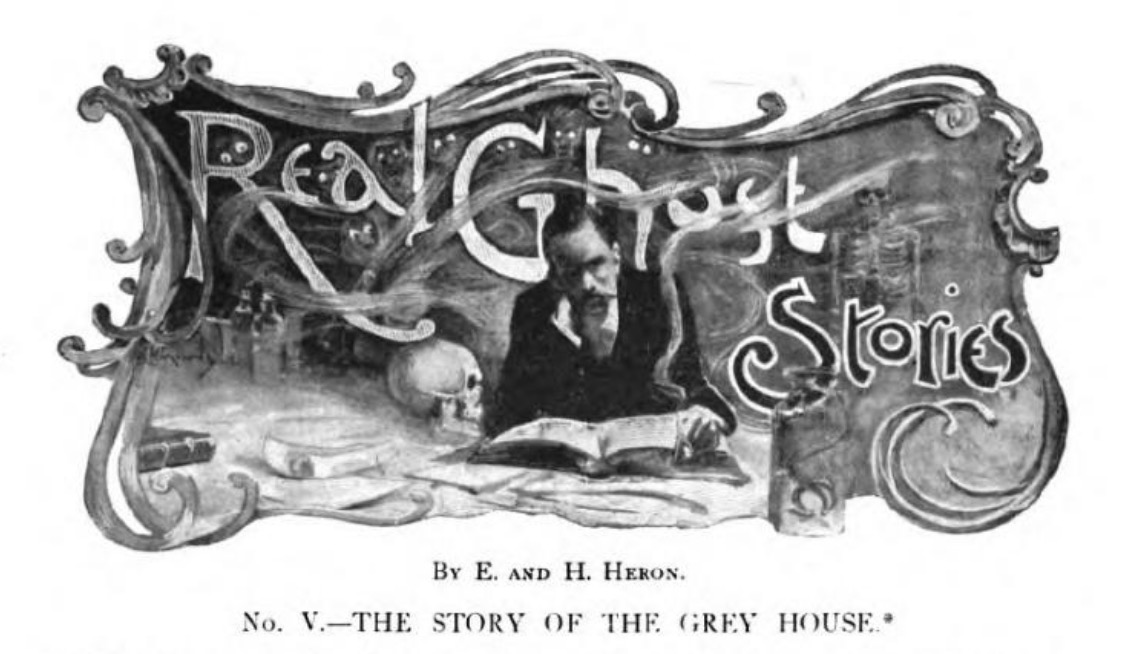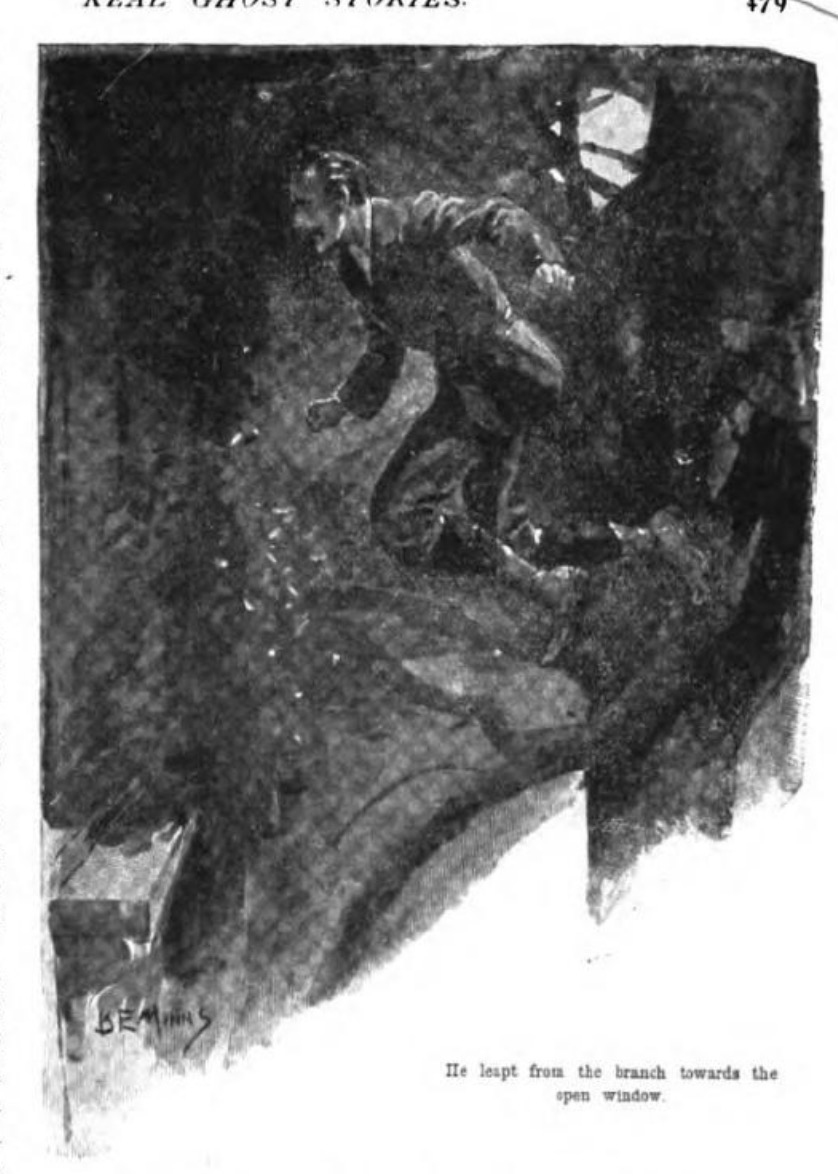THE STORY OF THE GREY HOUSE (4)
By:
October 11, 2024

HiLoBooks is pleased to serialize E. and H. Heron’s occult detective tale “The Story of the Grey House” (Pearson’s Magazine, 1898, so technically just before the sf genre’s Radium Age) for HILOBROW’s readers. Flaxman Low’s curiosity is piqued by the history of the Grey House, where numerous residents have been found mysteriously hanged… even though no rope is ever found.
ALL INSTALLMENTS: 1 | 2 | 3 | 4 | 5.
Without a moment’s consideration, Mr. Low seized the branch nearest to him and, swinging himself up into the tree, he climbed with a frantic effort towards the window of Montesson’s room, from which he was almost sure the sound had come. Being an unusually active and athletic man, he leaped from the branch towards the open window, and fell headlong in upon the floor. As he did so, something seemed to pass him, something swift and sinuous that might have been a snake, and disappeared out of the window!
Remembering a candle on the toilet table, he lit it when he regained his feet and looked about him.
Montesson lay on the floor “crumpled up,” as he had himself described Lawrence’s position. Low recalled this with misgiving as he hurried to his side. A dark smear like blood was on Montesson’s cheek, but though unconscious, he was still alive. Low lifted him on to the bed and did what he could to rouse him, but without success. He lay rigid, breathing the slow, almost imperceptible, respiration of deep stupor.

Low was about to go to the window, when the candle suddenly went out, and he was left in the increasing darkness, to all intents alone, to face an unknown though tangible assailant.
Silence had again fallen upon the house—that is, the silence of night, and woodlands, and many-folded leafage, and the things that go by night. He stood by the window and listened. His senses were acute and throbbing; he felt as if he could hear for miles. The scent of the scarlet blossoms rose like deadening fumes into his brain, and he drew away from the window, and, feeling strangely spent, threw himself upon a couch. Then he drew out the knife at his belt, and strung himself up to watchfulness with an effort.
He knew that the attack he had to expect would be likely to come from the direction of the window. He saw the faint, swimming moonlight that fell through the leaves and tendrils of the creeper fade slowly away. Probably clouds were coming up over the sky, for the steamy heat was even more oppressive.
The low window-sill was scarcely more than a foot above the floor, and presently he fancied something was moving along the carpet among the entangling shadows of the leaves, but the darkness was now intensified, and he could not be sure. Montesson’s breathing had become quieter. It was the dead hour of the night; hardly a sound was to be heard.
Suddenly Low felt a soft touch upon his knee. His whole consciousness had been so absorbed in the act of listening that this unexpected appeal to another sense startled him. Here and there—rapid, soft, and light—the touches passed over his body. It might have been some animal nosing about him in the dark. Then a smooth, cold touch fell upon his cheek.
Low sprang up, and slashed about him in the darkness with his knife.
In that instant the thing closed with him—a flexuous, snaky thing that flung its coils about his limbs and body in one swift spring like a curling whiplash!
Flaxman Low was all but helpless in the winding grasp of what? — the tentacles of some strange creature? or was it some great snake, this sentient thing that was feeling for his throat? There was not an instant to lose. The knife was pressed against his body; with a violent effort he drew it sharply, edge outwards, against the tightening coils. A spurt of clammy fluid fell upon his hand, and the thing loosed and fell away from him into the stifling gloom. . . .
In the morning Montesson came to himself in one of the lower rooms at the other side of the house. Fremantle was beside him.
“What’s the matter?” he asked. “Ah, I remember now. There’s Low. It has beaten us again, Fremantle! It is hopeless. I don’t know what happened—I was not asleep, when I found myself seized, lifted up, drawn towards the window, and strangled by living ropes. Look at Low!” he went on harshly, raising himself. “Why, man, you’re all over blood!”
Flaxman Low glanced down at his hands.
“Looks like it,” he said.
“It has beaten even you, Low!” went on Montesson. “There is something much more terrible and tangible than a ghost in this cursed house! See here!”
RADIUM AGE PROTO-SF: “Radium Age” is Josh Glenn’s name for the nascent sf genre’s c. 1900–1935 era, a period which saw the discovery of radioactivity, i.e., the revelation that matter itself is constantly in movement — a fitting metaphor for the first decades of the 20th century, during which old scientific, religious, political, and social certainties were shattered. More info here.
SERIALIZED BY HILOBOOKS: Jack London’s The Scarlet Plague | Rudyard Kipling’s With the Night Mail (and “As Easy as A.B.C.”) | Arthur Conan Doyle’s The Poison Belt | H. Rider Haggard’s When the World Shook | Edward Shanks’ The People of the Ruins | William Hope Hodgson’s The Night Land | J.D. Beresford’s Goslings | E.V. Odle’s The Clockwork Man | Cicely Hamilton’s Theodore Savage | & many others.
